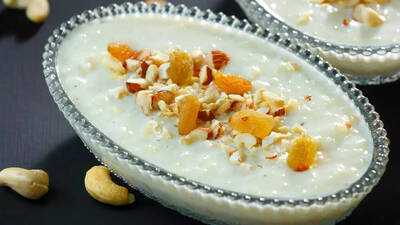Karwa Chauth is one of the most popular and celebrated festivals observed by married women and among Indian communities across the world. Observed on the fourth day after the full moon (Purnima) in the Hindu month of Kartik (usually in October or November), the festival symbolizes love, devotion, and the sacred bond between husband and wife. As per Panchang, the word Karwa refers to an earthen pot used to store water, while Chauth means the fourth day. Traditionally, the pot symbolizes prosperity, peace, and well-being, forming an essential part of the rituals observed on this day.
Karwa Chauth 2025: Date and Time
Chaturthi Tithi Begins - October 9, 2025 - 10:54 PM
Chaturthi Tithi Ends - October 10, 2025 - 07:38 PM
Karwa Chauth Puja Muhurat - October 10, 2025 - 05:57 PM to 07:11 PM
Karwa Chauth Upavasa Time - October 10, 2025 - 06:19 AM to 08:13 PM
Krishna Dashami Moonrise on Karwa Chauth Day - October 100, 2025 - 08:13 PM

Significance of Karwa Chauth
Karwa Chauth represents a wife’s unconditional love and prayer for her husband’s long life, prosperity, and safety. The fast is a symbol of emotional strength, patience, and faith, reflecting the deep-rooted belief that sincere devotion can protect loved ones from harm. In recent times, many husbands also fast alongside their wives as a gesture of mutual love and equality, highlighting the emotional reciprocity in modern relationships. On this day, married women perform solah shringar for their husbands and dress up like a newly-wed bride and then perform the rituals for the well being of their husband.
Food rules to follow
Eat a balanced sargi: The pre-dawn meal (Sargi) is your main source of strength for the entire day. It is suggested to add complex carbs like oats, sabudana, poha, or whole wheat parathas for steady energy. Also, proteins such as paneer, milk, yogurt, or dry fruits can be added to meals to sustain muscle energy. Hydrating fruits like watermelon, papaya, and oranges are ideal to prevent dehydration. And, one should avoid salty, spicy, or fried foods, as they can increase thirst and make fasting harder.

Stay hydrated before the fast begins: Since traditional fasting restricts water throughout the day, hydration before sunrise is essential. It is suggested to drink at least 2–3 glasses of water before the fast. One can also add coconut water or buttermilk to diet to maintain electrolyte balance. Avoid tea and coffee, as caffeine can cause dehydration and acidity later in the day.
Keep the body cool: During the fasting hours, avoid overexertion. Engage in calm activities like reading, light chores, or preparing for the evening rituals. Practice deep breathing or meditation to conserve energy.

Avoid temptation: Cooking or being around heavily aromatic foods during fasting can trigger hunger pangs. If possible, prepare light meals early in the day for the family to avoid being exposed to strong food smells.
Break the fast gently: After the moon is sighted, start with a few sips of water or milk. And try to stick to homemade foods such as khichdi, dal, or soft chapatis. Also, one can have light sweets like kheer or halwa in moderation to restore energy. It is suggested to avoid fried snacks, aerated drinks, and caffeine immediately after fasting, as they can upset your stomach.
Add iron- and vitamin-rich foods post-fast: It is said to add fruits like dates, spinach, pomegranate, and lentils to your post-fast meal. They restore iron and energy levels after the long day of abstaining from food and water.
Listen to your body: As per experts, if you feel dizzy, weak, or dehydrated, do not hesitate to break the fast with water or a fruit. Also, those with medical conditions such as diabetes, low blood pressure, or acidity should consult a doctor before observing a full-day fast.
See More: Karwa Chauth 2025 Mehendi designs: 10 never-before-seen Mehendi designs for Karwa Chauth
5 must-have bhog for Karwa Chauth
Karwa Chauth is not only a day of fasting and devotion but also a time for offering gratitude through traditional bhog (food offerings) to Goddess Parvati, Lord Shiva, and the Moon God. Each item in the bhog thali holds symbolic meaning, representing purity, prosperity, and blessings for a long, harmonious married life.
Sargi Thali Delights: This is the first ritual of the festival, where women consume Sargi, a pre-dawn meal gifted by their mothers-in-law. It usually includes pheni (a vermicelli sweet made in milk), dry fruits, fruits, and coconut. The sweetness of pheni signifies love and warmth, while fruits and nuts provide strength for the day-long fast. Coconut, being auspicious, symbolizes purity and fertility.
Halwa-Poori: This combo is a traditional offering in almost every North Indian household during Karwa Chauth. The rich aroma of ghee-laden sooji halwa and crispy pooris adds a festive charm to the rituals. These are offered first to the deities and then shared among family members after breaking the fast. The sweetness of halwa symbolizes happiness and togetherness.

Mathri and Namak Pare: Savory items like mathri and namak pare are included in the bhog. These snacks represent stability and endurance—qualities essential for a strong marriage.

Rice Kheer: This sweet dish holds a special place in Hindu rituals, and during Karwa Chauth, it’s offered to the Moon God as part of the bhog. Made with rice, milk, and sugar, it symbolizes prosperity and peace.
Fruits and Dry Fruits: Fruits and dry fruits are an indispensable part of the bhog thali. They are offered to the goddess to signify purity and nature’s abundance. Seasonal fruits like bananas, apples, and pomegranates are preferred, as they symbolize fertility, health, and good fortune.
See More: Happy Karwa Chauth 2025: Top 50 wishes, messages greetings and quotes and whatsapp statuses to share with your family and friends
Thumb and Embed Images Courtesy: istock
Karwa Chauth 2025: Date and Time
Chaturthi Tithi Begins - October 9, 2025 - 10:54 PM
Chaturthi Tithi Ends - October 10, 2025 - 07:38 PM
Karwa Chauth Puja Muhurat - October 10, 2025 - 05:57 PM to 07:11 PM
Karwa Chauth Upavasa Time - October 10, 2025 - 06:19 AM to 08:13 PM
Krishna Dashami Moonrise on Karwa Chauth Day - October 100, 2025 - 08:13 PM
Significance of Karwa Chauth
Karwa Chauth represents a wife’s unconditional love and prayer for her husband’s long life, prosperity, and safety. The fast is a symbol of emotional strength, patience, and faith, reflecting the deep-rooted belief that sincere devotion can protect loved ones from harm. In recent times, many husbands also fast alongside their wives as a gesture of mutual love and equality, highlighting the emotional reciprocity in modern relationships. On this day, married women perform solah shringar for their husbands and dress up like a newly-wed bride and then perform the rituals for the well being of their husband.
Food rules to follow
Eat a balanced sargi: The pre-dawn meal (Sargi) is your main source of strength for the entire day. It is suggested to add complex carbs like oats, sabudana, poha, or whole wheat parathas for steady energy. Also, proteins such as paneer, milk, yogurt, or dry fruits can be added to meals to sustain muscle energy. Hydrating fruits like watermelon, papaya, and oranges are ideal to prevent dehydration. And, one should avoid salty, spicy, or fried foods, as they can increase thirst and make fasting harder.

Stay hydrated before the fast begins: Since traditional fasting restricts water throughout the day, hydration before sunrise is essential. It is suggested to drink at least 2–3 glasses of water before the fast. One can also add coconut water or buttermilk to diet to maintain electrolyte balance. Avoid tea and coffee, as caffeine can cause dehydration and acidity later in the day.
Keep the body cool: During the fasting hours, avoid overexertion. Engage in calm activities like reading, light chores, or preparing for the evening rituals. Practice deep breathing or meditation to conserve energy.

Avoid temptation: Cooking or being around heavily aromatic foods during fasting can trigger hunger pangs. If possible, prepare light meals early in the day for the family to avoid being exposed to strong food smells.
Break the fast gently: After the moon is sighted, start with a few sips of water or milk. And try to stick to homemade foods such as khichdi, dal, or soft chapatis. Also, one can have light sweets like kheer or halwa in moderation to restore energy. It is suggested to avoid fried snacks, aerated drinks, and caffeine immediately after fasting, as they can upset your stomach.
Add iron- and vitamin-rich foods post-fast: It is said to add fruits like dates, spinach, pomegranate, and lentils to your post-fast meal. They restore iron and energy levels after the long day of abstaining from food and water.
Listen to your body: As per experts, if you feel dizzy, weak, or dehydrated, do not hesitate to break the fast with water or a fruit. Also, those with medical conditions such as diabetes, low blood pressure, or acidity should consult a doctor before observing a full-day fast.
See More: Karwa Chauth 2025 Mehendi designs: 10 never-before-seen Mehendi designs for Karwa Chauth
5 must-have bhog for Karwa Chauth
Karwa Chauth is not only a day of fasting and devotion but also a time for offering gratitude through traditional bhog (food offerings) to Goddess Parvati, Lord Shiva, and the Moon God. Each item in the bhog thali holds symbolic meaning, representing purity, prosperity, and blessings for a long, harmonious married life.
Sargi Thali Delights: This is the first ritual of the festival, where women consume Sargi, a pre-dawn meal gifted by their mothers-in-law. It usually includes pheni (a vermicelli sweet made in milk), dry fruits, fruits, and coconut. The sweetness of pheni signifies love and warmth, while fruits and nuts provide strength for the day-long fast. Coconut, being auspicious, symbolizes purity and fertility.
Halwa-Poori: This combo is a traditional offering in almost every North Indian household during Karwa Chauth. The rich aroma of ghee-laden sooji halwa and crispy pooris adds a festive charm to the rituals. These are offered first to the deities and then shared among family members after breaking the fast. The sweetness of halwa symbolizes happiness and togetherness.

Mathri and Namak Pare: Savory items like mathri and namak pare are included in the bhog. These snacks represent stability and endurance—qualities essential for a strong marriage.
Rice Kheer: This sweet dish holds a special place in Hindu rituals, and during Karwa Chauth, it’s offered to the Moon God as part of the bhog. Made with rice, milk, and sugar, it symbolizes prosperity and peace.
Fruits and Dry Fruits: Fruits and dry fruits are an indispensable part of the bhog thali. They are offered to the goddess to signify purity and nature’s abundance. Seasonal fruits like bananas, apples, and pomegranates are preferred, as they symbolize fertility, health, and good fortune.
See More: Happy Karwa Chauth 2025: Top 50 wishes, messages greetings and quotes and whatsapp statuses to share with your family and friends
Thumb and Embed Images Courtesy: istock
You may also like

'Get out of my f****** shot': California gubernatorial hopeful Katie Porter's outburst goes viral - who is she?

'Historic developments unfolding': Trump expected to visit Jerusalem after Hamas-Israel ceasefire; may also address Knesset

Keep gutters 'clear' with 4 'easy methods and without a ladder

Donald Trump eyes Nobel: Award panel explains why Israel-Gaza pact won't impact decision; why is Norway on edge?

Monu Ratra to join Capri Global Capital as CEO after exit from IIFL Home Finance







